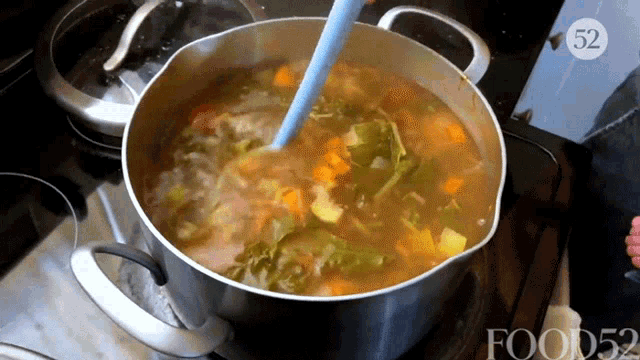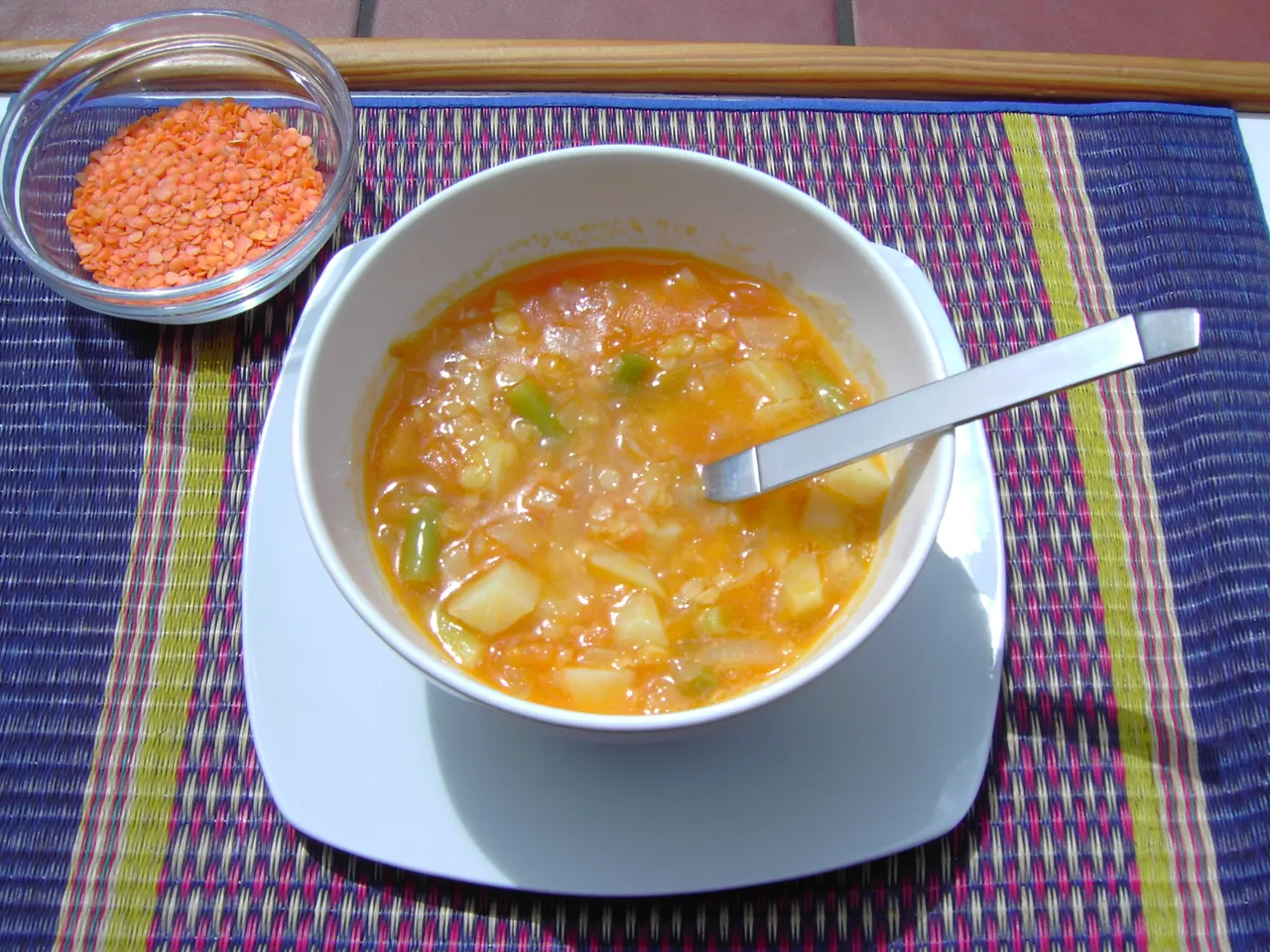A Sunday of rest. This February 4th things are calm in my #simplelife. Until yesterday my brother and I were feeling unwell, but today we are better, you can say we are fine, compared to yesterday. My closest sister called, and we talked for quite some time. There's not much more to tell really, my personal issues are pretty simple.
Leading a life that can be considered boring, it is understandable that I dedicate most of my daily post to commenting on various topics, such as the anniversaries of #History. For today, I focused on an anniversary in the food area, and it is a holiday that I didn't know existed. Today is 'Homemade Soup Day'.
+++
Leading a life that can be considered boring, it is understandable that I dedicate most of my daily post to commenting on various topics, such as the anniversaries of #History. For today, I focused on an anniversary in the food area, and it is a holiday that I didn't know existed. Today is 'Homemade Soup Day'.
+++
Un domingo de descanso. Este 4 de febrero las cosas están en calma en mi #vida simple. Hasta ayer estábamos mi hermano y yo con malestar, pero ya hoy estamos mejor, se puede decir que estamos bien, en comparación con ayer. Mi hermana más cercana llamó y hablamos por bastante tiempo. No hay mucho más que contar en realidad, mis asuntos personales son bastante simples.
Llevando una vida que puede considerarse como aburrida, es comprensible que dedique la mayor parte de mi registro del post del día a comentar temas diversos, tales como las efemérides de la #Historia. Para el día de hoy, me enfoqué en una efeméride del área de la #comida, y es una festividad que yo no sabía que existía. Hoy es el ‘Día de la Sopa Casera’.
+++
Llevando una vida que puede considerarse como aburrida, es comprensible que dedique la mayor parte de mi registro del post del día a comentar temas diversos, tales como las efemérides de la #Historia. Para el día de hoy, me enfoqué en una efeméride del área de la #comida, y es una festividad que yo no sabía que existía. Hoy es el ‘Día de la Sopa Casera’.
+++

Image's Source - Fuente de la Imagen
I found that the date was very specific and focused on a particular type of #soup, and that seemed striking to me. I remembered that I had read that soup has several days of celebration on the calendar, but I had not seen that there was a particular day for homemade soup. But, firstly, let's look at a little of the history of this #food preparation.
When we seek to find out the origin of the soup, we may be surprised that there is archaeological evidence that traces its roots back to the Upper Paleolithic (between 40,000 and 10,000 years before the present). A time marked by glaciation in which different hominid groups disappeared (Homo erectus, Denisovan hominid, Homo neanderthalensis, Homo floresiensis, etc.), and only the hominid group Homo sapiens remained… Which is us.
I was surprised when I read that archaeological evidence indicates that, to prepare the soup back then, holes were carved in stone into which water and various ingredients were poured, and then pebbles were heated in bonfires, and then dropped into the liquid. With this procedure, after several hot pebbles, the water cooked the food and the soup was ready. I found this cooking method very creative, and I wasn't expecting it. But, that explains how soup could be made before there was pottery or metallurgy technology. After the development of pottery and metal handling, the first pots appeared, and the technique for soup changed completely.
+++
When we seek to find out the origin of the soup, we may be surprised that there is archaeological evidence that traces its roots back to the Upper Paleolithic (between 40,000 and 10,000 years before the present). A time marked by glaciation in which different hominid groups disappeared (Homo erectus, Denisovan hominid, Homo neanderthalensis, Homo floresiensis, etc.), and only the hominid group Homo sapiens remained… Which is us.
I was surprised when I read that archaeological evidence indicates that, to prepare the soup back then, holes were carved in stone into which water and various ingredients were poured, and then pebbles were heated in bonfires, and then dropped into the liquid. With this procedure, after several hot pebbles, the water cooked the food and the soup was ready. I found this cooking method very creative, and I wasn't expecting it. But, that explains how soup could be made before there was pottery or metallurgy technology. After the development of pottery and metal handling, the first pots appeared, and the technique for soup changed completely.
+++
Yo encontré que la fecha estaba muy específica y enfocada en un tipo particular de #sopa, y eso me pareció llamativo. Recordé que había leído que la sopa tiene varios días de celebración en el calendario, pero no había visto que hubiera un día en particular para la sopa casera. Pero, antes que nada, veamos un poco de la historia de esta preparación de comida.
Cuando buscamos averiguar el origen de la sopa, nos podemos sorprender de que se tienen evidencias arqueológicas que remontan sus raíces hacia el Paleolítico Superior (entre 40.000 y 10.000 años antes del presente). Una época marcada por la glaciación en la que distintos grupos homínidos desaparecieron (Homo erectus, Homínido de Denísova, Homo neanderthalensis, Homo floresiensis, etc.), y quedó solamente el grupo homínido Homo sapiens… que somos nosotros.
Yo me sorprendí cuando leí que, las evidencias arqueológicas señalan que, para preparar la sopa en aquel entonces, se tallaban en piedra unos agujeros en los que se vertía agua y varios ingredientes, para luego calentar guijarros en fogatas, y dejarlos luego caer en el líquido. Con este procedimiento, luego de varios guijarros calientes, el agua cocía los alimentos y la sopa estabas lista. Este método de cocción lo encontré muy creativo y no me lo esperaba. Pero, eso explica cómo se podía hacer sopa antes de que hubiera la tecnología de alfarería o de metalurgia. Luego del desarrollo del manejo de alfarería y el manejo de metal es que aparecen las primeras ollas, y la técnica para la sopa cambia completamente.
+++
Cuando buscamos averiguar el origen de la sopa, nos podemos sorprender de que se tienen evidencias arqueológicas que remontan sus raíces hacia el Paleolítico Superior (entre 40.000 y 10.000 años antes del presente). Una época marcada por la glaciación en la que distintos grupos homínidos desaparecieron (Homo erectus, Homínido de Denísova, Homo neanderthalensis, Homo floresiensis, etc.), y quedó solamente el grupo homínido Homo sapiens… que somos nosotros.
Yo me sorprendí cuando leí que, las evidencias arqueológicas señalan que, para preparar la sopa en aquel entonces, se tallaban en piedra unos agujeros en los que se vertía agua y varios ingredientes, para luego calentar guijarros en fogatas, y dejarlos luego caer en el líquido. Con este procedimiento, luego de varios guijarros calientes, el agua cocía los alimentos y la sopa estabas lista. Este método de cocción lo encontré muy creativo y no me lo esperaba. Pero, eso explica cómo se podía hacer sopa antes de que hubiera la tecnología de alfarería o de metalurgia. Luego del desarrollo del manejo de alfarería y el manejo de metal es que aparecen las primeras ollas, y la técnica para la sopa cambia completamente.
+++

Image's Source - Fuente de la Imagen
Making a sharp jump in time, or ellipsis, we have one of the oldest descriptions of a soup recipe in the 'Banquet of the Sophists', written in Rome by Athenaeus. Although, the designation of the dish as soup came a few centuries later. The name 'soup' seems to have ancient Germanic roots (soffa), and designated (until the middle of the first century AD) a food preparation in which bread was sliced, toasted, and placed on top a broth or stew cooking. During the European Middle Ages, the word traveled across the continent and adapted to both local languages and the language of exchange, Latin, giving rise to the name 'suppa' . All the names we know for it in Romance Languages and in languages with Anglo-Saxon roots have been derived from this Latin word.
By the way, I couldn't quite figure out the origin of the holiday. At the very least, I found out that it focused on homemade soup because it is about reclaiming homely food, placing the focus on making healthy food at home and consuming it both for economy and to strengthen emotional and social ties between family members. That sounds pretty good.
Well, I say goodbye, wishing you that you are well and that we can read again another time.
+++
By the way, I couldn't quite figure out the origin of the holiday. At the very least, I found out that it focused on homemade soup because it is about reclaiming homely food, placing the focus on making healthy food at home and consuming it both for economy and to strengthen emotional and social ties between family members. That sounds pretty good.
Well, I say goodbye, wishing you that you are well and that we can read again another time.
+++
Haciendo un fuerte salto de tiempo, o elipsis, tenemos una de las más antiguas descripciones de una receta de sopa en el ‘Banquete de los Sofistas’, escrito en Roma por Ateneo. Aunque la designación del plato como sopa vino unos siglos después. El nombre de ‘sopa’, parece que es de raíz germana antigua (soffa), y designaba (hasta mediados del primer siglo de nuestra era común) una preparación de comida en que se rebanaba pan, se tostaba, y se le colocaba por encima una cocción de caldo o potaje. Durante la Edad Media Europea, la palabra viajó por el continente y se fue adaptando tanto a las lenguas locales como a la lengua de intercambio, el latín, por lo que surge el nombre de ‘suppa’. De esta palabra latina se han derivado todos los nombres que le conocemos en lenguas romances y en lenguas de raíces anglosajonas.
Por cierto, no pude averiguar bien el origen de la festividad. Cuando menos, averigüé que se enfocaba en la sopa casera porque se trata de reivindicar la comida hogareña, colocando el enfoque en hacer comida saludable en casa y consumirla tanto por economía, como para el refuerzo de lazos afectivos y sociales entre los miembros de la familia. Eso suena bastante bien.
Bien, ya me despido, deseándote que tú estés bien y que nos podamos leer de nuevo en otra oportunidad.
+++
Por cierto, no pude averiguar bien el origen de la festividad. Cuando menos, averigüé que se enfocaba en la sopa casera porque se trata de reivindicar la comida hogareña, colocando el enfoque en hacer comida saludable en casa y consumirla tanto por economía, como para el refuerzo de lazos afectivos y sociales entre los miembros de la familia. Eso suena bastante bien.
Bien, ya me despido, deseándote que tú estés bien y que nos podamos leer de nuevo en otra oportunidad.
+++

This post, on the #blockchain #Hive, is in the We Are Alive Tribe community, it's part of the #IAmAliveChallenge
This challenge is an initiative of @flaxz
The 4 points to join the #IAmAliveChallenge, includes using the hashtag #alive to post to We Are Alive Tribe and earn ALIVE tokens.
This challenge is an initiative of @flaxz
The 4 points to join the #IAmAliveChallenge, includes using the hashtag #alive to post to We Are Alive Tribe and earn ALIVE tokens.
Esta publicación, en la #blockchain #Hive, está en la comunidad We Are Alive Tribe, es parte del #IAmAliveChallenge
Este desafío es iniciativa de @flaxz
Los 4 puntos para unirte al #IAmAliveChallenge, incluyen el uso de la etiqueta #alive para publicar en We Are Alive Tribe y ganar tokens ALIVE.
Este desafío es iniciativa de @flaxz
Los 4 puntos para unirte al #IAmAliveChallenge, incluyen el uso de la etiqueta #alive para publicar en We Are Alive Tribe y ganar tokens ALIVE.
